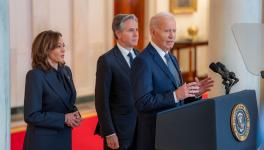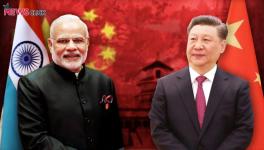Biden Casts a Spell on Arabia’s Shifting Sands
Saudi Arabia’s King Salman (L), called Turkish President Recep Erdoğan (R) on Nov. 20, 2020 to discuss reset of relations.
Thecontroversial meetingbetween Israeli prime minister Benjamin Netanyahu and Saudi Arabia’s Crown Prince Mohammed bin Salman (commonly known as MbS) in Neom, the mega-city under development on the Red Sea coast, on November 22 drew world attention away from the 2020 G20 Riyadh summit hosted by King Salman bin Abdulaziz Al Saud.
In normal circumstances, it is preposterous for a crown prince to usurp media limelight. But it is improbable that MbS acted defiantly. The G20 was important for King Salman and MbS — for the latter, even more so, as the event held the potential to showcase Saudi Arabia as a young, vibrant society transforming under his personal supervision.
However, a phone call King Salman made on the eve of the G20 summit to Turkish president Recep Erdogan was an even more exceptional gesture than the meeting at Neom. The two countries have a deeply troubled relationship over the brutal murder of the journalist Jamal Khashoggi in the Saudi consulate in Istanbul in 2018 and Erdogan blaming MbS.
In fact, the trial in absentia of twenty Saudi officials was to resume in Istanbul on November 25. The UN Special Rapporteur Agnès Callamard had concluded that Khashoggi was “the victim of a deliberate, premeditated execution” for which the Saudi state was responsible.”
None of the Saudi suspects are ever likely to be extradited to Turkey to face justice; and Saudi Arabia has already held its own kangaroo trial, in secret, last year and hopes to draw the curtain over the incident. But then, the Turkish intelligence service that bugged the Saudi consulate in Istanbul possesses the vital audio tape of the journalist’s last minutes before he was overpowered and killed.
The Turkish prosecutors accuse Saud al-Qahtani, a former senior adviser to MbS and Ahmad Asiri, Saudi Arabia’s former deputy intelligence chief, of “instigating a premeditated murder with the intent of torment through fiendish instinct”. The 18 other defendants are charged with carrying out “a premeditated murder with the intent of torment through fiendish instincts”.
To be sure, King Salman and MbS know that Erdogan has the possibly damning evidence.
According to theTurkish readoutof the conversation between King Salman and Erdogan on November 20, there was a substantive exchange on the Saudi-Turkish ties. It said,“The relations between Turkey and Saudi Arabia were discussed, and views on the G20 Leaders’ Summit, whose term chair is Saudi Arabia this year, were exchanged.
President Erdoğan and King Salman agreed on keeping channels of dialogue open in order for the bilateral relations to be enhanced and for issues to be settled.”
Indeed, one phone call doesn’t make a summer. Nothing was settled as a result of the conversation, but importantly, the Khashoggi trial in Istanbul has now been postponed to March.
King Salman’s phone call to Erdogan and the meeting in Neom between Netanyahu and MbS can be seen as back-to-back developments signifying Riyadh’s first foreign policy moves to adjust to the imponderables of the incoming Joe Biden presidency in America.
Biden and his nominees for Secretary of State, Antony Blinken and National Security Advisor, Jake Sullivan have signalled unequivocally that a dramatic shift in the US’ Middle East policy can be expected, which would include, amongst others,
- more pressure on Saudi Arabia and Egypt over human rights,
- a mission to revive the 2015 Iran nuclear deal,
- an end to the war in Yemen,
- a good look at the rushed sale of F-50 stealth aircraft to the UAE by the Trump administration,
- a tough line on Turkey’s interventionist policies in the region, and,
- a relaunch of attempts – with less concession for Netanyahu – to bring Palestinian and Israeli officials back to the negotiating table.
When it comes to Saudi Arabia, Blinken has publicly rebuked President Trump’s cozy relationships with MbS and Egypt’s President Abdel Fattah el-Sisi. Blinken said said Trump had “basically given a blank cheque to pursue a disastrous set of policies, including the war in Yemen, but also the murder of Jamal Khashoggi”.
In geopolitical terms, the US would move in concert with its European allies to stabilise conflict areas in the Middle East by making moves towards ceasefires and peace deals — in Yemen, Libya and Syria. Sullivan, who was instrumental in the early backchannel negotiations that eventually lead to the 2015 Iran nuclear deal,is on record that a relaunch of negotiations will be a top priority for new administration in its first 100 days in office.
Biden administration will not allow the regional allies to interfere with the plans to salvage the Iran nuclear deal. To be sure, the issue of Iran was one main focus of the Netanyahu-MbS meeting — how to coordinate their push back against the US engagement of Iran.
But the most dramatic and emblematic of changes in the US’ Middle East policies is expected to be towards Saudi Arabia, which could include the cutting off of arms sales to the kingdom.In this context, King Salman’s call to Erdogan can only be seen as a Saudi initiative to improve relations with Turkey and take a coordinated approach to meet the expected pressure from the Biden administration that both countries anticipate.
Saudi Arabia’s overture to Turkey goes hand in hand with its attempts lately to seek a solution to the dispute with Qatar. Of course, the Saudis are intensely conscious that the American opinion is still exerting pressure on MBS for his alleged role in the Khashoggi murder and, therefore, regard it is advantageous to pacify Erdogan.
Following King Salman’s conversation with Erdogan, Saudi foreign minister hailed amicable ties with Turkey and rejected claims of any boycott on Turkish goods. Erdogan duly reciprocated in his G20 address by warmly commanding the Saudi leadership. It is entirely conceivable that the two countries appreciate that cooperation, rather than rivalry, better serves their interests.
The crux of the matter is that Trump (and his son-in-law Jared Kushner) empowered MbS, which encouraged the latter to redesign the region with radical policies based on the three pillars of Riyadh’s hostility against the Arab Spring elements and the Muslim Brotherhood, sympathy toward pro-Israel policies and the longstanding rivalry with Iran.
MbS’ overreach in the recent years, masterminded by his Emirati counterpart Mohammed bin Zayed (MbZ), resulted in a regional alignment with Saudi Arabia, the UAE and Egypt (and lately Israel) arrayed on one side against Turkey, Qatar and Iran.
But, fundamentally, both Turkey and Saudi Arabia are powerful players that can steer regional changes and if they pool efforts, it can become a game changer in Middle Eastern politics. After all, acting in unison in Syria, they almost brought Bashar al-Assad to his knees in 2015, prompting Russia to intervene.
That is to say, both Saudi Arabia and Turkey understand the need to be on friendly terms with each other in the emergent situation, as Trump prepares to leave the White House.Sans Trump, neither Saudi Arabia nor Turkey pulls any weight in the Beltway. Turkey does not consider Iran to be hostile, but Saudi Arabia hopes to enlist Ankara’s support against Tehran’s regional agenda.
Having said that, an equal relationship between Saudi Arabia and Turkey is difficult to reach, as the two countries not only carry a huge backlog from history but the latter has undoubtedly grown through the past decade to become a powerful regional player today in a way that Riyadh cannot possibly match. Therefore, a détente may be problematic.
The sticking point is the Saudi alliance with the UAE. The Sunni Middle East, simply put, doesn’t have enough space for the vaulting ambitions of Erdogan, MbS and MbZ. The Abraham Accords becomes an ‘X’ factor further complicating the regional balance.
Courtesy: Indian Punchline
Get the latest reports & analysis with people's perspective on Protests, movements & deep analytical videos, discussions of the current affairs in your Telegram app. Subscribe to NewsClick's Telegram channel & get Real-Time updates on stories, as they get published on our website.
























